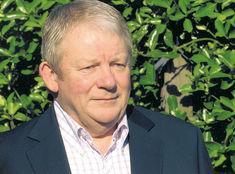
“I still look forward to arriving in the office each morning,” says 67-year-old Wyer; which could be seen by some as a tall order after nearly 40 years in the potato business.
His experience ranges from first selling seed potatoes for JE England & Sons of Norfolk, through to his current position as marketing manager for Rowe Farming Ltd, Cornwall.
“I can see myself carrying on to the end of the 2008 season, then working part-time from April to the end of August,” says Wyer, who grew on around 1,600 acres in the 2006 season, an expansion from 550 acres when he first took on the position with Rowe in March 2000.
The reason for his enthusiasm about the potential for the Cornish potato industry stems mainly from the successful development and diversification of new (and traditional) varieties.
In the wake of the shift from wholesale markets to control by the big multiples, a healthy increase in demand has been created for heritage and specialist potatoes. Customers no longer like to consider potatoes merely in terms of being nameless, faceless ‘reds and whites’, he says.
The base market for these varieties may have been small, but great efforts are being made to make the most of rewarding advertising campaigns. Production is being transformed to capitalise on the new mood and subsequent upsurge in the marketplace.
“There is not much room for further expansion, although some growers are expanding their acreage, due to smaller growers finding it uneconomical to continue,” Wyer admits. “But there are better varieties, husbandry and healthier seed,” he says, since he first started in this area of agriculture - after moving from poultry farming. These factors, along with “developments in packaging and harvesting” have meant that with careful choices, the farms on the slopes of the right-hand side of the A30, including the so-called ‘Golden Mile,’ are able to make the most of the gap in supply early in the year.
Wyer’s long career has covered a significant period in the evolution of the potato industry. The current upsurge in price potential comes as a welcome renaissance at this stage in a career into which he has “settled with ease, despite all the changes,” and which has seen him work for a variety of great names; with some of whom he still trades and exchanges ideas.
Having left JE England for Dalgety in 1972, Melvyn then went to Scott and Newman in 1976, to trade both seed and ware potatoes and work on further developing the Cornish new potato trade, an area of business he had started to build up with Dalgety. He was later to be reunited with Dalgety in the early 1990s, when its interests expanded in the South West.
Wyer refers to Ray Owen, his managing director at Scott and Newman, as “like a father figure” to him, “leading his sales team by example” and the man who encouraged him to “take a lead in securing contracts with major processors.” He still remains friends with Owen and his family.
By 1988, after realising the changes occurring in the trade and shifting sales from the wholesalers to the pre-pack trade and the multiples, Wyer formed the Duchy Potato Group, to meet the demand of this expanding business.
Based near Land’s End, he had “30 farmers committed to supply through the group” and part of their promotion and PR campaign took them on an unusual trip to Buckingham Palace. Realising the value of the name ‘Duchy’ and its obvious association with Prince Charles and Cornwall, a plan was hatched to undertake a rather unorthodox marketing campaign.
A white Rolls Royce was hired to present a gift of their Premier brand potatoes in a sack displaying the company’s new insignia. Wyer not only delivered the goods into the safe keeping of a rather perplexed aide, but also struggled with a half-hundred weight the significant distance from the security gates at the end of Downing Street, to the front door of Number 10.
The Duchy Group then joined forces with Univeg, under the banner Cornish Potatoes Ltd, running the supply of their cabbage and cauliflowers parallel to the potatoes. Later, when a management buyout at Dalgety caused the formation of Greenvale AP, it was recognised that CPL “needed to create a brand image for Cornwall.” Subsequently, the ‘Cornish King’ brand was launched.
“Today the brand is being marketed with Cornish potatoes, brassica and cream,” says Wyer. It has also been “widely used by the Cornish Tourist Board.”
It was Greenvale’s 1999 withdrawal from Cornwall that precipitated his move to Rowe, with whom he had first had dealings in 1967, trading with the Rowe Brothers’ late grandparents.
He says his brief is to market Rowe’s potatoes in the first instance, but he does have two or three associate neighbouring growers with whom he works, marketing their crops.
Wyer continues to look forward to success with their varieties Premier and Lady Christ and the sensitive-skinned salad potatoes Charlotte and Maris Peer, so suited to his low acidity soil areas. He also heads the push towards a new era in the production of exclusive quality potatoes, by growing Tesco’s own premium variety, Smile.



